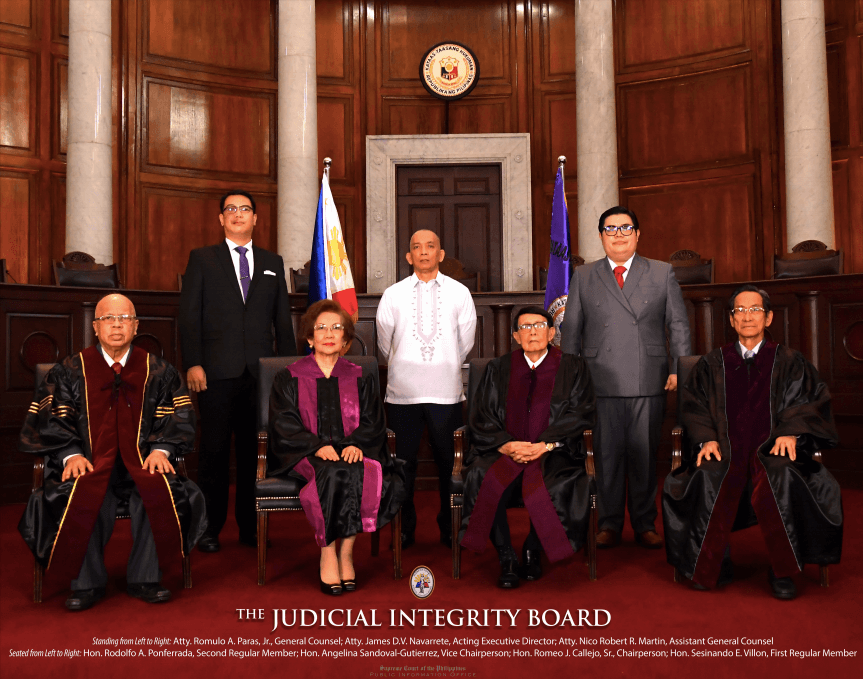SUMMARY
This is AI generated summarization, which may have errors. For context, always refer to the full article.

MANILA, Philippines – The Supreme Court recently suspended for two months without pay and fined a judge in Manila for saying during a hearing that God hates gays.
The decision adopted the recommendation of the Judicial Integrity Board (JIB), a new body in the court that promises to weed out the corrupt and unethical officials faster and more efficiently.
The Supreme Court suspended Manila Metropolitan Trial Court Judge Jorge Emmanuel Lorredo for two months, and imposed a fine of P50,000 for saying during a hearing that “pagka-bad[i]ng, tomboy, lesbian, ayaw ng Diyos ‘yun (being gay or lesbian, God hates that)” and “‘pag meron kang lesbian relationship, paparusahan ‘yung anak mo. Dengvaxia, di ba? [Kayo din] kasi may kasalanan kayo sa Diyos eh (if you have a lesbian relationship, your child will suffer. Remember Dengvaxia? You committed a sin.)
The JIB actually wanted a harsher penalty seeing that the judge also admitted to having settled a hundred cases using bible passages, making a connection between a litigant’s sexual orientation and the case. The JIB said this makes the judge guilty of gross misconduct.
Instead, the Court “adopted but modified” the JIB’s recommendation, “finding that the proper nomenclatures of the violations of Judge Lorredo are conduct unbecoming and simple misconduct, as well as work-related sexual harassment under Civil Service Commission (CSC) Resolution No. 01-0940,” said the Court in a ruling on March 2.
What’s the JIB
There is no shortage of horror stories of judges and court staff, for example, fixing annulment cases. This has bred a culture of corruption that the Court wants solved – systemically.
Enter JIB, a justice league of sorts whose sole task is to discipline, or kick out, the bad guys in the judiciary.
The JIB will receive complaints against all judges and justices up to appellate courts, as well as all employees and officials up to the Supreme Court. It means the 15 justices of the Supreme Court are the only ones not under the jurisdiction of the JIB. This is because Supreme Court justices are impeachable officers under the Constitution, meaning, they may only be removed via impeachment or quo warranto.
The JIB has an Office of General Counsel, who will represent the anonymous complainants, or even private complainants who cannot afford their own lawyer.
JIB promises to be proactive. It says in a media briefer: “proceedings may be instituted, motu proprio (on its own initiative) on the basis of records, documents; or newspaper or media reports; or other papers duly referred or endorsed to it for appropriate action.”
What’s the process
After years in the conceptualization process, the JIB was established in 2018 through an administrative order (AO) during the time of retired chief justice Teresita Leonardo-De Castro. There was no movement on the AO during the time of retired chief justice Lucas Bersamin. A newer AO was issued only in August 2020 during the time of then-chief justice Diosdado Peralta, fine-tuning some details in the structure.
By October 2020, the board had taken their oath: retired SC justice Romeo Callejo is the chairperson; retired SC justice Angelina Sandoval-Gutierrez, the vice chairperson: retired Sandiganbayan justice Rodolfo Ponferrada and retired Court of Appeals justice Sesinando Villon as members. There’s a seat for a third member that’s vacant.
All complaints, whether formally filed or sent anonymously, would go through the general counsel for the case buildup. That way, the general counsel is like the prosecutorial arm of the board, while also providing legal assistance to complainants.
The executive director makes the first evaluation before it goes to the board. The board of retired justices sends the recommendation to the Supreme Court.
The JIB promises that this process will take from two to four months only, before results are seen.
According to JIB’s data, complaints against regional trial court judges have not gone down below 100 since 2015. There were fewer complaints filed against judges in metropolitan trial courts, municipal trial courts in cities, municipal trial court and municipal circuit trial courts, peaking at 88 in 2015, and 60 in 2021.
But there were even more complaints filed against court personnel reaching a high of 485 in 2016, that pushed the docket to have 962 pending complaints by 2021.
To send a complaint to the JIB, you may contact:
Office of the Executive Director: 8536-97-97 or email cds_jib.sc@judiciary.gov.ph
Office of the General Counsel: 0908-8505046 (general counsel), 09088505675 (assistant general counsel) or email ogc.sc@judiciary.gov.ph
– Rappler.com
Add a comment
How does this make you feel?





There are no comments yet. Add your comment to start the conversation.